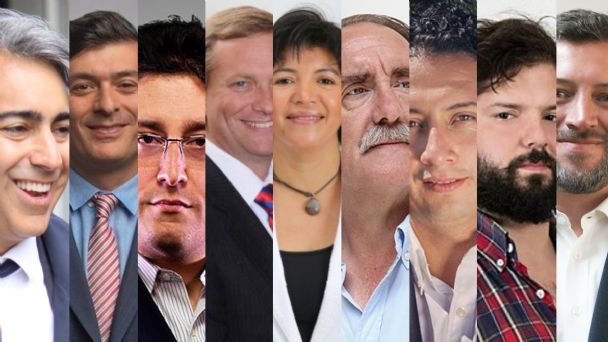RIO DE JANEIRO, BRAZIL – A total of nine candidates will compete for the Presidency of Chile in the elections next November 21, after the deadline for the registration of candidates ended at midnight.
The great battle is expected to be between the conservative Sebastián Sichel, the leftist Gabriel Boric, and the Christian Democrat Yasna Provoste, representatives of the political pacts with the greatest popular support in the country, but the range of candidates was not completed until the Electoral Service (Servel) closed the registrations.

The last hours were frenetic, and some last-minute surprises, such as professor Sergio Tapia, who came to register as an independent but was excluded for not complying with all the technical requirements, such as having a sufficient number of witnesses at the event.
Other candidacies that waited until near the end of the registration deadline were those of Mapuche activist – the majority indigenous ethnicity – Diego Ancalao, who will compete for The People’s List, a citizens’ pact born out of the 2019 protests, and that of Eduardo Artés, from the more radical left.
From the far right is Jose Antonio Kast, from the Republican Party, a staunch defender of traditional values and the reduction of the state that in recent weeks has gained weight in the polls.
Pension fund manager Gino Lorenzini, economist Franco Parisi and the progressive Party (PRO), Marco Enríquez-Ominami, will make his fourth attempt to reach La Moneda (seat of government), have also formalized their candidacies.
All candidacies, however, are pending to be analyzed and confirmed by the electoral body.
THE FAVORITES
The first round of the presidential elections will be held next November 21, which also elect deputies, senators, and regional councilors. If no candidate reaches 40% of the votes, the runoff will be held on December 19.
Experts assure that the challenge for the three favorite candidates is to conquer the center and attract the middle class, which historically decides the elections in Chile.
In this sense, a tough fight is expected between Yasna Provoste, from the traditional center-left movement Unidad Constituyente (now baptized for the elections as Nuevo Pacto Social), and Sebastián Sichel, former independent minister of the current government of Sebastián Piñera and to whom a center profile is attributed. However, he represents the current right-wing ruling bloc Chile Vamos (now renamed Chile Podemos Más).
Further to the left of Provoste is the former student leader Gabriel Boric, of the Frente Amplio (FA), a movement similar to that of Podemos in Spain, which ousted in the primaries the one who at the time seemed to be the favorite in the polls, the communist Daniel Jadue.
“From Sichel, what the country can expect is nothing different from what the government of Sebastián Piñera is offering today, they are the same, with the same ideas”, said Provoste, the only female candidate and recognized for her work as president of the Senate, in addition to having been former minister of Michelle Bachelet and Ricardo Lagos.
Meanwhile, Sichel, who has assured on several occasions to do politics “far from ties”, questioned his opponent’s attacks, added that “it is the best sample of the absence of a speech”, and said he prefers the debate with Boric.
“I like much more the debate with Gabriel Boric regarding the type of society we have, which is absolutely different, but at least I think there is a debate of ideas and not simply of old politics,” Sichel indicated.
Boric, for his part, who, like Sichel, is seen as a generational change in Chilean politics, said that he would fight to “offer an alternative of change to Piñera and his continuity” and encouraged people to “not be afraid of youth” to change the country.
The person who replaces the current president, conservative Sebastián Piñera, will have to put back on track a country that experienced in 2019 a strong social and political crisis and implement the rules of the new Constitution, which began to be drafted last July and must be endorsed in an exit plebiscite, scheduled for 2022.

